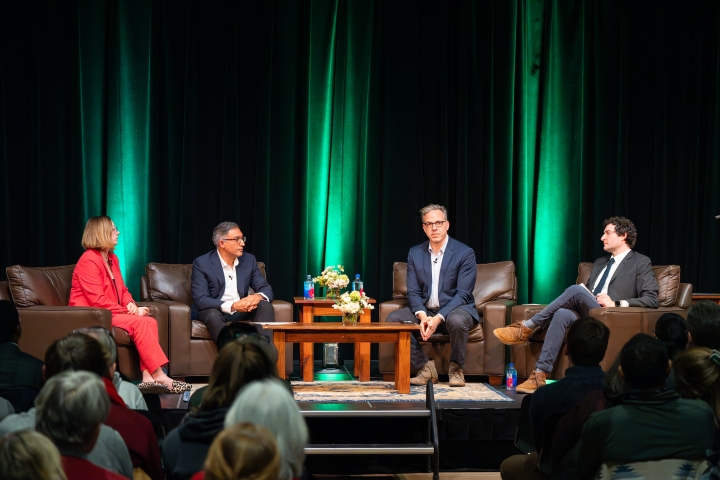The presidential election in November will likely come down to the same swing states as in 2020, along with the role of the Supreme Court and other courts weighing criminal charges against former President Donald Trump.
That was the verdict Thursday evening from CNN anchor Jake Tapper ’91 and former Acting Solicitor General Neal Katyal ’91, who held an hour-long conversation at Collis Center on An Election on Trial.
Nearly 300 people, the majority of them students, were in attendance, and the event was livestreamed. By Friday afternoon, more than 10,300 people had watched the conversation, which was co-sponsored by the Rockefeller Center, the Department of Government, and Dartmouth Minority Pre-Law Association.
Katyal and Tapper took on a wide range of issues, including how abortion and reproductive rights and the war in Gaza will be a factor in driving people to vote (or not); public confidence in the Supreme Court; and the accuracy of polls that show President Joe Biden running behind former President Trump.

A key question is if the Supreme Court will decide, in a case it heard three weeks ago, whether Trump can be barred from re-election under the 14th Amendment, which states that someone who engaged in insurrection is ineligible to hold federal office.
“I don’t want you to lose all faith and hope in the Supreme Court,” Katyal said, in response to a student’s question about whether the court was now viewed as just another polarized, dishonest institution. “In 2020 Donald Trump asked the U.S. Supreme Court 12 different times to rule for him. They stayed out of it entirely.”
Further, Katyal said, in 2021 the court, in an 8-1 ruling, threw out Trump’s claim of executive privilege against the January 6th Committee.
Tapper countered that the court has changed in recent years, due in part to Trump’s three nominees.
“This is a very political court. John Roberts, the chief justice of the United States, does not want it to be that. But John Roberts is not in control of his court,” Tapper said.
Katyal and Tapper are both members of the Dartmouth Board of Trustees, which is in town for meetings, and have been friends since their first year in Hanover.
Katyal asked whether polls should be discounted and whether they had become more reliable after the embarrassment of 2016, when polls widely predicted that Hillary Clinton would win the presidency over Trump.
“I’m pretty poll-skeptic,” Tapper said. More and more people have switched to cell phones, making them harder for pollsters to reach; people no longer answer their landlines; and there are conservatives who will not participate in polling, he noted. Additionally, the polling industry had not “learned how to correct for mistakes it’s made in the past.” But they are good, he said, at “reflecting vibes.”
The battleground swing states of Wisconsin, Michigan, Arizona, Georgia, and Pennsylvania will probably decide the 2024 election, Tapper said. And that pattern of squeezing out victory by looking for a decisive 100,000 votes in swing states will probably continue, he added.
Rockefeller Center Executive Director Anna Mahoney, one of the moderators, asked whether the 2024 election is an anomaly or a harbinger. “Is this some playbook that future candidates will want to pick up?” she asked.
“I do think this is an anomaly. I think our constitutional structure is designed to weed out (candidates like Trump), although I’ll give it to Trump. It’s a special sauce, a special ability to market himself,” Katyal said.
“Nothing in American politics is a one-off,” Tapper responded, pointing out that Trump is not the first president to vehemently deny allegations that turned out to be true. “I do think his form of politics—personal insults, attacking the press and institutions—I don’t think that’s going anywhere.”

After the event, Irene Wang ’23 said she found Katyal “really articulate and scholarly” and Tapper “very witty” and engaged.
“It’s anyone’s game who could take the election,” given all the issues and unknowns in play, said Bryan Shea, Thayer ’25.
Just as interesting as the discussion, said Virginia Dickson ’27, was listening to the two alumni talk about how they forged the careers they did. “Who in our class will be in that position 30 years from now?” Dickson said.


